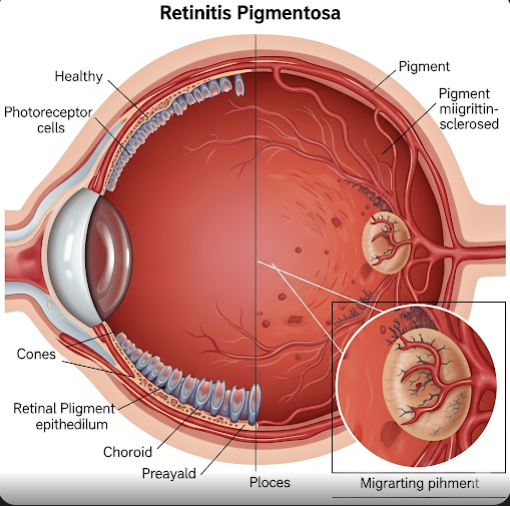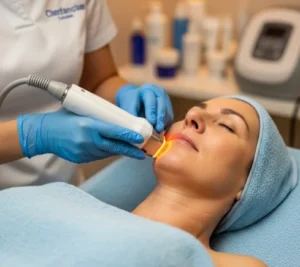Overview
Retinitis pigmentosa (RP) is a group of rare, inherited eye disorders that cause progressive damage to the retina, the light-sensitive tissue at the back of the eye. This condition leads to gradual vision loss, beginning with difficulty seeing at night and loss of peripheral vision, and can eventually result in blindness. Although there is no complete cure, early diagnosis and advanced treatment can help slow the progression of the disease and preserve vision for as long as possible.
What is Retinitis Pigmentosa?
Retinitis pigmentosa is caused by genetic mutations that affect the ability of the retinal cells—particularly the photoreceptor cells (rods and cones)—to function properly. Rod cells, which are responsible for vision in low light, are usually affected first, followed by cone cells, which control color and central vision. RP can occur alone or as part of other genetic syndromes. The disease usually develops slowly over many years, but in some cases, vision loss can progress more rapidly.
Symptoms
Common symptoms of RP include
- Difficulty seeing in dim or low light (night blindness)
- Gradual loss of peripheral (side) vision, leading to “tunnel vision”
- Sensitivity to bright light (photophobia)
- Difficulty adapting from light to dark environments
- Blurred or distorted central vision in later stages
- Problems with color perception in advanced disease
Causes
Retinitis pigmentosa is primarily caused by inherited genetic mutations that are passed down in different patterns:
- Autosomal dominant inheritance
- Autosomal recessive inheritance
- X-linked inheritance (more severe in males)
These mutations cause degeneration of the photoreceptor cells in the retina, leading to progressive vision loss.
Risk Factors
Factors that increase the risk of RP include
- Family history of retinitis pigmentosa
- Carrying specific genetic mutations linked to the disease
- Belonging to a family with known inherited retinal disorders
- Presence of related genetic syndromes such as Usher syndrome (hearing and vision loss)
Complications
Possible complications of RP include
- Complete blindness in advanced stages
- Difficulty performing daily activities due to vision impairment
- Increased risk of cataracts
- Macular edema (swelling of the retina)
- Psychological effects such as depression or anxiety due to vision loss
Prevention
There is no known way to prevent RP since it is a genetic condition, but steps to reduce complications include
- Undergoing genetic counseling before starting a family
- Regular eye examinations for early detection in at-risk individuals
- Protecting eyes from excessive sunlight with UV-protective glasses
- Managing related eye conditions promptly
Treatment Options in Korea
While there is no cure for retinitis pigmentosa, South Korea offers a range of advanced therapies, supportive treatments, and clinical research opportunities aimed at slowing disease progression and improving quality of life.
1. Nutritional Therapy – Specialized vitamin A supplementation under medical supervision may slow disease progression in some patients.
2. Low Vision Rehabilitation – Korean vision rehabilitation centers provide training, magnifying devices, and mobility aids to maximize remaining vision.
3. Management of Complications – Surgical removal of cataracts and medical treatment of macular edema to preserve central vision.
4. Retinal Prosthesis (Bionic Eye) – Advanced medical centers in Korea offer retinal implant devices, such as the Argus II system, for selected patients with severe vision loss.
5. Gene Therapy and Clinical Trials – Several Korean research hospitals are involved in global clinical trials for gene-based treatments, targeting the specific mutations causing RP.
6. Integrative Approaches – Some Korean medical clinics incorporate acupuncture, herbal medicine, and antioxidant therapies to support overall eye health, though these are complementary rather than curative.
7. Leading Korean Eye Hospitals for RP Care
- Seoul National University Hospital – Department of Ophthalmology
- Kim’s Eye Hospital – Retinal Disease Center
- Asan Medical Center – Genetic Eye Disease Clinic
- B&VIIT Eye Center – Advanced Retinal Research Unit













